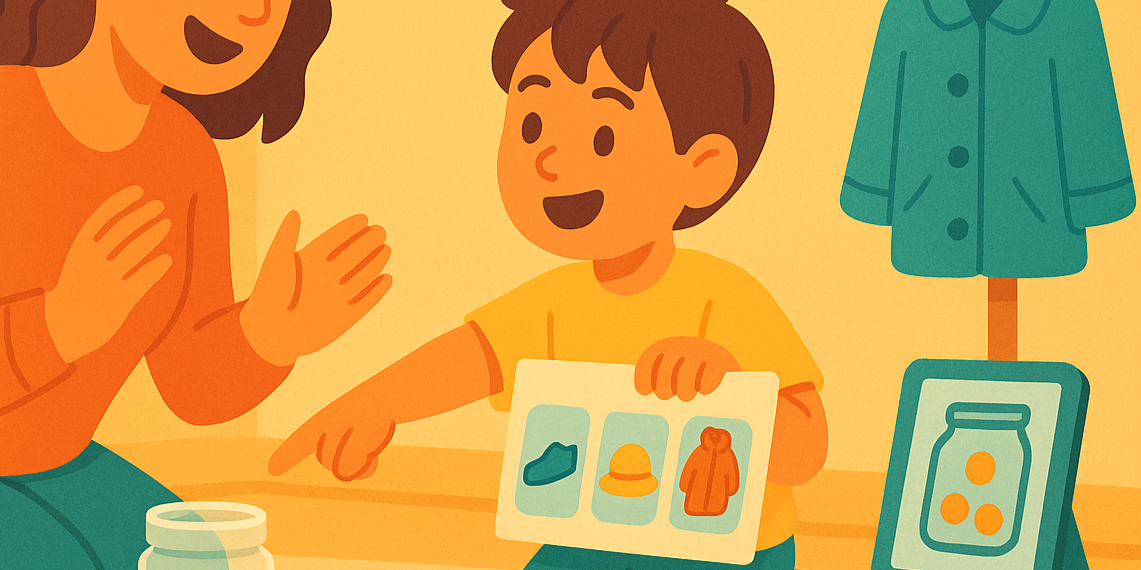
effective speech therapy activities for parents at home
4 September, 2025
Last Updated November 19,2025
Watching your child’s language development is one of the most rewarding parts of being a parent. If you're looking for ways to support their journey, you've come to the right place. Effective speech therapy doesn't have to be limited to a formal setting. By incorporating simple and fun activities into your daily life, you can play a crucial role in your child's progress. Early intervention is key, and these at-home strategies provide a wonderful way to boost communication skills in a playful, supportive environment.
Key Highlights
-
You can support your child's speech therapy by integrating simple activities into daily routines.
-
Turning everyday moments like mealtimes and bedtime into language-building opportunities is a great way to practice.
-
Focusing on one specific goal at a time, such as a target word or sound, makes learning more manageable.
-
Using fun speech therapy games and activities helps improve communication skills and keeps your child engaged.
-
Creating a positive and patient environment is essential for building your child's confidence in their language development.
Speech Therapy Activities Parents Can Do at Home: Simple Daily Routines That Work

Do you have a child who faces challenges with speaking or communicating? A great way to help them is by using fun and engaging speech therapy activities at home. Speech therapists often use games to help clients practice language, and you can adopt the same approach.
These activities can be tailored to be more or less challenging depending on your child’s age and specific needs, making learning both effective and enjoyable. What are some effective speech therapy activities for children to improve their language skills? The options are endless, from vocabulary games to board games and beyond.
The goal of these speech therapy activities is to make practice feel like play. You can focus on target words, speech sounds, pronunciation, or sentence fluency without making it seem like a chore.
By transforming learning into a game, you encourage your child to participate enthusiastically. How can parents encourage speech and language development at home through activities? The key is to find what your child enjoys and weave language practice into those moments, whether it's through drawing, playing with toys, or exploring the outdoors.
Quick answer — what parents can start today
Are you a busy parent looking for easy ways to support your child’s speech? You can start with quick speech therapy activities that fit seamlessly into your day. For younger kids, simple games like "I Spy" are perfect. One person chooses an object everyone can see and gives clues until someone guesses it. The player who guesses correctly then uses the word in a sentence, helping with turn-taking and sentence fluency. Another quick idea is to find a word search suitable for your child's age and have them say each word aloud as they find it.
What are some quick speech therapy activities I can do daily? While driving or walking, you can play the Alphabet Game, where your child finds letters of the alphabet on signs. For an extra challenge, ask them to say a word that starts with each letter they find. These simple games help practice speech sounds and build essential communication skills without needing special equipment or extensive planning, making them perfect for any parent.
Choose one target: convert a goal to a SMART home skill
To make at-home speech therapy effective, it helps to focus on one goal at a time. Instead of trying to fix everything at once, choose a single target word or sound to practice. This turns a broad objective into a specific, measurable, achievable, relevant, and time-bound (SMART) goal.
By aligning the activity with your child’s interests, you can make the practice more engaging. For example, if your child loves cars, you can focus on the "vroom" sound or words related to vehicles. This approach makes learning feel natural and fun. Now, let’s explore how to create the right atmosphere and find the best materials for these activities.
Creating a Positive Learning Environment
A supportive and encouraging atmosphere is the foundation of successful at-home speech therapy. When your child feels safe and celebrated, they are more likely to practice their communication skills. Always be patient and engaged, and remember that every child learns at their own pace.
It's also important to follow your child’s lead. If they aren’t interested in an activity, don’t force it. Instead, find something they enjoy and adapt it for language practice. This child-led approach ensures the best user experience and keeps them motivated. A positive learning environment also helps build crucial social skills as they learn to interact with confidence.
Instead of correcting mistakes, gently model the correct pronunciation or sentence structure. For instance, if your child says “daw” for “dog,” you can respond with, “Yes, that’s a big dog!” This reinforces the correct form without causing frustration and nurtures a healthy learning process.
Tools and Materials Parents Can Use
Here are simple, accessible tools that families can use at home in 2025:
-
Visual schedules for routines like morning, bedtime, or chores.
-
AAC-friendly apps such as Proloquo2Go or LAMP — even if you’re not using a full AAC device yet, these apps help children communicate choices.
-
Storybooks and picture books (physical or digital).
-
Real-life items: toys, food items, clothing, bathroom items — anything your child interacts with daily.
-
Communication boards or core-word boards (free versions available online).
-
Natural household items like cups, spoons, bubbles, blocks, or balls.
Feel free to keep examples, but remove any outdated or irrelevant U.S.-only games or inactive app links.
Daily Routines that Encourage Speech and Language Skills
Recent clinical guidance highlights that short, frequent practice sessions are far more effective than long, occasional ones.
Aim for 5–10 minutes, 2–3 times per day, rather than one long block of practice. Small bursts of repetition create better carryover into real-life communication.
In 2025, therapists increasingly focus on context-based learning — meaning the best speech therapy doesn’t happen at a desk, but in real environments like:
-
mealtimes
-
playtime
-
bath time
-
getting dressed
-
shared book reading
-
outdoor play
This lines up perfectly with parent-led routines at home.
Mealtime Conversations and Describing Foods
Mealtime is a perfect opportunity for a wealth of speech therapy ideas. Instead of eating in silence, use this time to engage in conversation and introduce new vocabulary. You can describe the foods on your plate, talking about their colors, textures, and tastes. This helps your child learn descriptive words and make connections.
How can parents encourage speech and language development at home through activities? A great way is by asking open-ended questions. During meals, you can ask "wh-" questions like, "What does the carrot taste like?" or "Where did we get these apples?" This encourages your child to think and form more complex sentences.
Here are a few simple mealtime ideas:
-
Name Game: Ask your child to name five fruits or five vegetables on the table.
-
Describe the Food: Use target words to describe what you're eating, such as "crunchy," "sweet," or "soft."
-
Talk About Your Day: Take turns sharing something about your day, which helps practice conversational skills.
Bath Time, Bedtime, and Storytelling Activities
Just like mealtime, bath time and bedtime are excellent moments for speech therapy ideas. During bath time, you can introduce action words like "splash," "pour," and "scrub." The playful environment makes it easy to practice sounds and new words without any pressure.
Bedtime is ideal for storytelling and reading. Choose books with colorful illustrations and repetitive phrases. You can point to pictures and name them, encouraging your child to do the same. This helps with articulation and vocabulary. You can even create your own stories together or read comics, which adds a fun visual element.
Here are some activities to try:
-
Sound Play: During bath time, make sounds like "swoosh" for water or "pop" for bubbles.
-
Interactive Storytime: Use lift-the-flap books or books with textures to keep your child engaged. Ask questions about the story to check their comprehension.
-
Create a Story: Start a story with "Once upon a time..." and take turns adding sentences.
Social Skills and Communication Activities

Speech therapy is about more than just correct pronunciation; it's also about effective social communication. Building strong social skills helps children interact confidently with family members, friends, and peers. Activities that focus on listening, turn-taking, and understanding social cues are just as important as practicing speech sounds.
A speech pathologist can provide guidance on activities tailored to your child's needs, but there are many simple things you can do at home. What types of social skills activities can be included in speech therapy? Let’s explore some games and exercises that foster these essential skills.
Role-Playing and Turn-Taking Games
Role-playing is a fantastic way to practice social skills in a safe environment. Using pretend play sets like a toy kitchen or a doctor's kit allows your child to mimic real-life situations. You can guide them with phrases like "pour the tea" or "check the heartbeat," introducing new vocabulary and conversational routines.
Turn-taking is another fundamental aspect of social communication that can be practiced through games. Many speech therapy games for people of all ages are built around this skill. Whether it's a simple board game or a more active one, waiting for your turn teaches patience and the natural flow of conversation.
Here are some games that encourage role-playing and turn-taking:
-
Pretend Play: Use toy sets to act out scenarios like going to a restaurant or visiting the doctor.
-
Board Games: Simple games like Chutes and Ladders or Candyland are great for practicing turn-taking.
-
Heads Up! App: This fun smartphone game involves guessing words from clues, which naturally encourages speaking in turn.
-
"I Spy": This classic game requires players to take turns guessing and giving clues.
How NDIS Funding Supports At-Home Speech Therapy
Supporting your child’s communication at home is an important part of their progress — and the good news is that the NDIS can fund many of the speech therapy supports parents use every day.
Under the National Disability Insurance Scheme (NDIS), children may receive funding for:
-
Speech therapy sessions delivered in-clinic, at home, school, or via telehealth.
-
Parent coaching, so you know exactly how to support your child’s development between sessions.
-
Home-based practice tools, such as visual supports, AAC guidance, communication boards, or therapist-designed activities.
-
Collaborative sessions with your child’s teacher, childcare educator, or support worker.
Families usually access these supports through the Capacity Building – Improved Daily Living budget. If your child has developmental delay, speech or language difficulties, or autism, these supports are often included in their NDIS plan.
If you’d like personalised guidance, our team at daar provides:
-
NDIS speech therapy for children of all ages
-
Mobile speech therapy at home, school, or childcare
-
Clinic appointments in our child-friendly Sydney locations
-
Telehealth sessions for flexible support
We support families across Liverpool, Canterbury-Bankstown, Inner West, Fairfield, Campbelltown, Blacktown and surrounding Sydney suburbs.
Ready to help your child communicate with confidence?
At daar, we make speech therapy simple and family-friendly.You can choose between clinic appointments, mobile sessions at home, school, or childcare and NDIS-funded telehealth therapy. Our team supports your child — and empowers you — every step of the way. Book your consultation now with our experienced team and discover how personalised speech therapy can unlock your child’s full potential.
Frequently Asked Questions
Can I use NDIS funding for parent-led speech therapy activities at home?
Yes. The NDIS funds speech therapists to teach you strategies, activities, and routines so you can continue practising communication skills at home.
Which NDIS budget covers speech therapy for children?
Most families use Improved Daily Living. Some early intervention supports may also be covered under Early Childhood Early Intervention (ECEI).
Can speech therapists come to my home using NDIS funding?
Yes. Mobile sessions, school visits, and childcare visits can all be funded as long as they align with your child’s goals.
.svg)

















